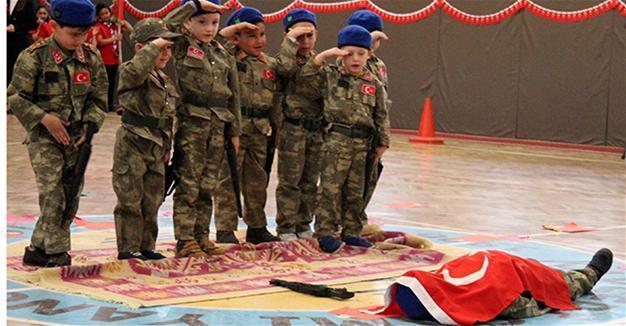Kindergarten children’s play including fake weapons, death draws criticism in central Turkey
KAYSERİ

DHA photo
A play involving fake weapons and scenes of death staged by kindergarten children in the Central Anatolian province of Kayseri has drawn criticism from the authorities and experts.The play, staged to mark National Sovereignty and Children’s Day on April 23, showed children clashing with each other using fake weapons and one of them falling to the ground as if he was killed. Another child then covered him with a Turkish flag to symbolize that he had been “martyred.”
Turkey celebrates the establishment of the Turkish Parliament with National Sovereignty and Children’s Day on April 23 every year, as it was bestowed by Mustafa Kemal Atatürk, the founder of Turkish Republic at the opening ceremony of parliament.
The April 23 celebrations in Kayseri were held in the sports hall of the Sami Yangın Anatolian High School due to heavy storms. Kayseri Governor Süleyman Kamçı, Melikgazi Mayor Memduh Büyükkılıç, Kocasinan Mayor Ahmet Çolakbayrakdar, Provincial Director of National Education Osman Elmalı, teachers and parents attended the celebrations in which students performed.
The event saw two separate plays staged by kindergarten students of the Şükrü Malaz Elementary School.
One of the plays was about the failed July 15, 2016 coup attempt, widely believed to have been masterminded by the Fethullahist Terrorist Organization (FETÖ). The other was about the Battle of Çanakkale – known in English as the Battle of Gallipoli – when Ottoman forces repelled an Allied assault on the Dardanelles in 1915 during World War I.
Some audience members applauded the play, though several members of the protocol reportedly voiced unease with the children’s use of fake weapons.
“Kindergarten children are very young for these types of plays. Children in middle or high school may better understand the situation,” clinical psychologist Börte Özdemir told daily Hürriyet on April 24, warning that scenes of violence could negatively affect children at such a young age.
“A child may perceive such a show about death as real and develop fear that his friend has died. The concept of death is hard to understand for children at this age, who may not understand the scenes of death or the covering with a Turkish flag as part of a performance,” Özdemir added.
She said children subjected to such performances may experience many negative effects, including developing irrational fears, seeing nightmares, and becoming over-attached to their parents.
“They may start to fear people in uniform such as police or soldiers. So it’s risky to give children weapons even if it’s only for a play. Such a play could normalize [weapons and death] in a child’s perception,” she added.
Another expert, Lütfü Ilgar, said preschool children cannot differentiate between reality and imagination.
“These types of plays are not suitable for the development of a child. Elements such as weapons, violence, death and blood should not be included in these types of events. It’s not appropriate for their mental health. A child cannot perceive it as a play. It may cause trauma,” Ilgar told daily Hürriyet.
“Messages suitable for children should be given in such performances. Whatever type of weapon is used - whether it’s plastic, wood or metal - it may cause children to think that using such a weapon, wounding or killing someone is normal. Plays should instead involve more humane themes, patriotism and love for the flag,” he added.
















